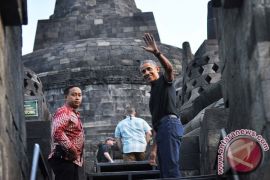In the temple`s compound, people from many different religious and ethnic backgrounds work hand in hand to prepare the house of worhip for Chinese New Year celebrations on January 23.
Local civil defense personnel (Hansip) most of whom are Muslim can be seen preparing themselves to guard the temple which will be visited by many people on the eve of or on Imlek as Lunar New Year is locally called.
The temple`s walls is given a new paint cover by workers who are mostly Muslims.
"We try our best to prepare the temple for the celebrations. That is why we need the cooperation of many sides, including people living around the temple," said Yu Ie (37), the Jin De Yuan temple`s manager. "It does not matter what their religion or ethnic identity is," Yu Ie added.
"I would really like to help here, because I have been living around here since I was little, and people from this temple have always been kind to me," said Suratin (50), one of the civil defense guards said.
Imlek was not listed as an official holiday on Indonesian calendars for many years but since early 2002, it has been a national holiday, indicating a strengthening of the nation`s interfaith and inter-ethnic sense of tolerance end respect.
"Historically, the Jin De Yuan temple is the oldest house of worhip of its kind in Jakarta. It was first built in 1650 but destroyed by the colonial government in 1740 and rebuilt in 1755 and then named Jin De Yuan which means virtue of gold." Yu Ie explained.
In the runup and during Imlek, the alley way leading to the temple from its main gate is usually lined by beggars of various ethnicities and religions who expect tithes from temple goers.
"We do not feel disturbed by or try to drive the beggars away from the front of the temple as long as they behave in orderly manner," said Yu Ie. (*)
Editor: Kunto Wibisono
Copyright © ANTARA 2012










